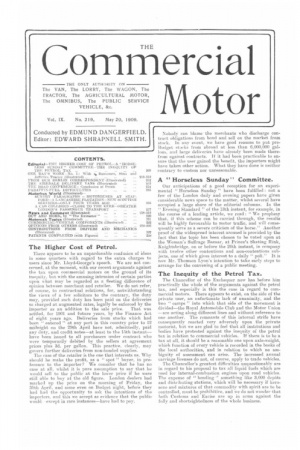The Inequity of the Petrol Tax.
Page 1

If you've noticed an error in this article please click here to report it so we can fix it.
The Chancellor of the Exchequer now has before him practically the whole of the arguments against the petrol tax, and especially is this the case in regard to commercial motors. There appears to exist, on the side of the private user, an unfortunate lack of unanimity, and the two " camps " into which that side of the movement is divided—the Royal Automobile Club and the Motor Union —are acting along different lines and without reference to one another. The remnants of this internal strife have consequently reacted very adversely upon the private motorist, but we are glad to feel that all institutions and bodies have protested against the inequity of the petrol tax in relation to commercial vehicles. If there is to be a tax at all, it should be a reasonable one epon axle-weight, which function of every vehicle is recorded in the books of the local authorities, and in relation to which no ambiguity of assessment can arise. The increased. annual carriage licenses do not, of course, apply to trade vehicles.
The Chancellor's greatest difficulties unquestionably are in regard to his proposal to tax all liquid fuels which are used for internal-combustion engines upon road vehicles. The expense of "bonding " something like 3,000 depots and distributing stations, which will be necessary if kerosene and mixtures of that commodity with spirit are to be controlled, must be prohibitive, and we do not wonder that both Customs and Excise are up in arms against the folly and shortsightedness of the whole business.




















